Kathy Howard's Blog: Unshakeable Faith for Life, page 63
December 11, 2014
Expecting the Unexpected

Julie Sanders is my guest today. The following post is based on her new book “Expectant,” a devotional book for expecting Moms.
 Most women expect to experience the “normal” path of family and mothering. But life doesn’t always happen like we expect. Like many of us, Elizabeth, the mother of John the Baptist, learned that a life of faith often takes unexpected turns.
Most women expect to experience the “normal” path of family and mothering. But life doesn’t always happen like we expect. Like many of us, Elizabeth, the mother of John the Baptist, learned that a life of faith often takes unexpected turns.
When Zechariah came home from serving at the temple he brought long-awaited, but miraculous news. By this time though, Elizabeth had long since laid her expectations to rest. For so many years, she hoped with hesitation turned to heaviness. Elizabeth waited to feel her womb full with a child long enough for other women to conceive, grow, give birth, and raise their beloveds to families of their own. But her womb and her arms had been empty even as she dutifully welcomed child after child.
Whether a woman embarks on the mothering journey at a traditional time in a typical way, or at a surprising time in a singular way, God reveals Himself in motherhood. Children are given under the Father’s tender, watchful eye. God knows the longings and limitations of His own children, and He sees how every mother’s heart is expectant.
Elizabeth conceived just as the angel had told Zechariah. For his lack of faith, her husband waited wordlessly throughout her pregnancy. He believed in the power of his expectations, instead of the One who exceeds our hopes. Together, the aged man and wife became the humbled father and mother, for becoming a parent has a way of exposing our weakness and sending us to our knees. The elderly first-time mother must have wondered if she could manage an infant in her season of life, but as I share in EXPECTANT, “If He has given you a child to nurture, He can give you the energy and wisdom and desire to raise that child well.”
After most of a lifetime spent waiting and wondering, God did more than Elizabeth could ask or imagine, giving her a son who would be John the Baptist. Her boy was born just before Jesus and was sent to announce the coming Prince of Peace. God exceeded her expectations in the perfect time and in the perfect way.
God wants to do more than what you expect in your life and in your child’s life. How has God been working in “unexpected” ways in your life recently?

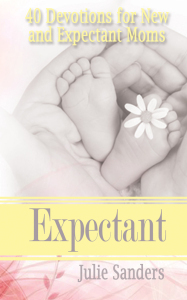 Julie lives where tea is sweet and grits are cheesy. She and her husband of 25 years have two nearly grown kids. EXPECTANT: 40 Devotions for New and Expectant Moms was born when God brought a group of young couples into their lives, just as they began to long to grow their families. Julie loves to teach God’s word to women in her hometown and across the globe; she is passionate about fighting human trafficking and helping women of all tribes and tongues find God’s peace for life. Check out Julie’s blog Come Have a Peace and Marriage Mondays to find reasons for peace and information about her ministry. “EXPECTANT” is available at Barnes & Noble and Amazon. Find Julie on Facebook, Twitter, and Pinterest.
Julie lives where tea is sweet and grits are cheesy. She and her husband of 25 years have two nearly grown kids. EXPECTANT: 40 Devotions for New and Expectant Moms was born when God brought a group of young couples into their lives, just as they began to long to grow their families. Julie loves to teach God’s word to women in her hometown and across the globe; she is passionate about fighting human trafficking and helping women of all tribes and tongues find God’s peace for life. Check out Julie’s blog Come Have a Peace and Marriage Mondays to find reasons for peace and information about her ministry. “EXPECTANT” is available at Barnes & Noble and Amazon. Find Julie on Facebook, Twitter, and Pinterest.
The post Expecting the Unexpected appeared first on Kathy Howard.
December 8, 2014
3 Steps to a Less Stress Christmas
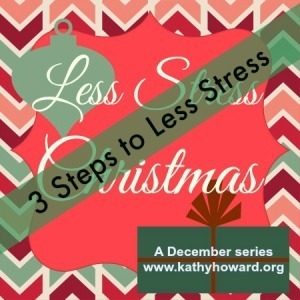 Feel buried under the deluge of Christmas activities and commitments? Is the stress mounting? It’s not too late to get Christmas under control. You can step back from the madness and refocus on the celebration of the birth of our Savior.
Feel buried under the deluge of Christmas activities and commitments? Is the stress mounting? It’s not too late to get Christmas under control. You can step back from the madness and refocus on the celebration of the birth of our Savior.
This is the third post in a series to help us de-stress Christmas. In the first post, we identified the problem. We are pressured by our culture, our peers, and ourselves to not just do it all, but to do it all with flair. Unfortunately, in the push to have the “perfect Christmas” we miss out on the best – the celebration and worship of Jesus. In the second post, we reflected on the priorities of the first Christmas – to share, worship, and ponder Jesus.
Today, we get practical by walking through 3 steps to help us cut back on the “quantity” of Christmas and hone in on the “quality.”
1. ASK
The day after Thanksgiving last year I was exhausted. I love having all my family, but cooking and dishes can take a toll. The thought of doing it all again in a few weeks overwhelmed me. So I asked the family how they’d feel about soup for Christmas dinner. To my surprise – and relief – every one of them said soup was just fine with them. Encouraged by their answer, I pressed a bit more. “How do you feel about the tree?” I had crossed a line with that one. The tree was a must. But I did make progress.
Last Christmas, we had soup instead of a huge, elaborate meal. It made a huge difference for me. I enjoyed the day and my family so much more. So just ask. Ask your family and ask yourself, what’s important and what’s not. You may be surprised too!
2. EVALUATE
Think about the various ways you spend your time during the holiday season. What activities consume the most of your time and resources? What activities do you dread? Are these activities necessary? More importantly are they valuable?
In Thursday’s post, we discovered that those who experienced the first Christmas “shared, worshiped, and pondered” Jesus. Do your Christmas activities help you or your family share, worship, or contemplate our Savior? Here’s another way to measure the value of the things in which you invest your money and time:
Does it put people over things?
Does it focus on spiritual things instead of physical things?
Does it further things that last or things that are temporary?
3. ELIMINATE
After you’ve asked and evaluated it’s time to follow through and actually eliminate some activities and cut back on others. I’m not saying we should cut out every fun activity if it doesn’t meet the criteria above. But we can find a balance that leaves plenty of room to share, worship, and ponder the Savior whose birth we celebrate.
If you dread hanging lights on the house then don’t do it! Seriously, what will it matter in the big scheme of things if you hang a wreath on the door and call it “done?!” Don’t want to make homemade cookies for the cookie exchange? Then don’t go or buy 6 dozen from a local bakery.
Even changing the way you do some activities can help. For instance, for years I was a “card snob.” I thought unless I addressed the envelopes by hand the cards were somehow “inferior.” But over the last few years, I’ve reclaimed time – and freedom – by printing my address labels. So feel free to buy those prepared pie crusts and cookie dough in a tub!
I really wonder what Jesus thinks when He sees us running around like chicken with our heads cut off during His birthday celebration. I’m sure there have been many times He has slowly shook His head and said, “Kathy, Kathy, you are worried and upset about many things, but few things are needed – or indeed only one” (Luke 10:41-42).
Believer, what would Jesus say to you? What one thing can you eliminate today to make time to sit at Jesus’ feet and bask in the joy of the season?
The post 3 Steps to a Less Stress Christmas appeared first on Kathy Howard.
December 4, 2014
3 Priorities of the First Christmas

Have you made a Christmas list? I’m not talking about a list of the gifts you hope you receive or even the gifts you intend to buy for others.
No, I’m talking about your Christmas “to-do” list. Maybe it looks something like this:
And the list could go on and on… Wow!
That’s a lot of stuff – and a lot of stress – for a holiday meant to celebrate the coming of the Prince of Peace.
 Monday, I began a series on having a “less stress Christmas.” The goal? To keep Christ the center of Christmas while enjoying the holidays with family and friends.
Monday, I began a series on having a “less stress Christmas.” The goal? To keep Christ the center of Christmas while enjoying the holidays with family and friends.
So, what can we do differently? Today, let’s go back to the first Christmas to discover the priorities of those who personally experienced the arrival of the long-awaited Messiah.
Shared Jesus (Luke 2:8-18) – A group of lowly shepherds in the fields around Bethlehem received an angelic announcement that the Savior had been born. After a late-night visit to the stable to see the miracle, they couldn’t keep the news to themselves. Scripture says, “they spread the word concerning the child.” They told everyone who would listen and “all who heard it were amazed.”
Worshiped Jesus (Matthew 2:10-12) – Magi from the east had seen the star and traveled a great distance to find the One who had “been born king of the Jews.” These important men put their lives on hold to seek the Savior. When they found Him, they were “overjoyed” and “bowed down and worshiped Him.”
Pondered Jesus (Luke 2:18-20) – Scripture tells us that Jesus’ mother Mary “treasured up” all the things she heard and saw and “pondered them in her heart.” Mary deeply contemplated everything God was doing. She meditated on it and considered what it all meant. It was constantly on her heart and mind.
The ones who were there that first Christmas shared, worshiped and pondered Jesus. He was their focus and their activity revolved around Him.
So how are we doing? It’s so easy to allow our focus to shift from Jesus and onto the many other things that vie for our attention during the Christmas season. Many of these things that compete for our time and thoughts are good things too. But too much of the “good” can push out the “best.”
We just have to find a proper balance. When we make Jesus the priority, then the other things will take their proper place. There will still be time for cookies, shopping, and tree trimming. And some things that seemed so important before may simply fall away and not even be missed.
Want to experience the true joy of Christmas? Share Jesus with others. Worship the King of kings with all that you are. And ponder the Savior and His love for you.
What have you allowed to become a priority this Christmas season at Jesus’ expense? What can you do differently?
The post 3 Priorities of the First Christmas appeared first on Kathy Howard.
December 1, 2014
Does Christmas Stress You Out?
 It’s the first day of December. Do you feel it?
It’s the first day of December. Do you feel it?
Everywhere we look we see the push. We feel the effects.
It shows up in advertising. It flashes from store displays. It taunts you from your Pinterest home feed.
Our consumer-oriented culture pressures us to have the “perfect Christmas” by having it all and doing it all with flair!
When I was a young mom, Martha Stewart set the bar high. And I bought into it. The house had to be spotless and every room had to look – and smell – like Christmas. My wrapping paper all coordinated with the tree. We took family photos and wrote a letter to send with the Christmas card – and I had to handwrite a greeting in each and every one. I made overflowing plates of homemade Christmas goodies for friends and neighbors. And my annual “Christmas Coffee” was not to be missed!
I was overworked and overstressed.
Women today still feel the pressure. Pinterest and DIY are king! Today, tasty cookies just aren’t enough. They have to also look like Reindeer or melting snowmen. Don’t settle for red fingernails when they can look like candy canes. There’s no excuse for a bare mantel when dozens of ideas to turn it into a Christmas wonderland are at your fingertips. Oh, and no party is complete without a cheese patter shaped like a Christmas tree.
Any of that sound familiar?
Busyness is nothing new. It was also a problem in the first century. Jesus had a friend named Martha who was too busy to spend time with Him. Once when He visited her home, she was too busy to sit and listen to Him talk about the things of God.
The Bible tells us Martha was “distracted by all the preparations” (Luke 10:40) she thought had to be made for Jesus’ visit. The Greek word translated as “distracted” in the NIV means “too busy, over-occupied, drawn away.” Martha wasn’t doing anything wrong or bad. She simply allowed all the “good things” to crowd out the best. She allowed the activity of the visit to replace the incredible opportunity she had to build relationship.
That’s exactly what many of us do during the Christmas season. We allow a lot of good activity to crowd out the true meaning of Christmas. Instead of worshiping, celebrating, and sharing the coming of our Savior we allow ourselves to be “over-occupied” with the trappings. Stress and exhaustion push out joy and peace.
In the next few blog posts, I’m going to share some of what God has taught me over the years about de-stressing Christmas. I will be honest with you, it’s still a battle. The ribbons and baking and glitter still tempt me. But overall, with God’s help, I have learned how to have a “less stress” Christmas so I can experience Jesus more.
What are some things – the busyness of the season – that tends to wrap you up and stress you out most?
The post Does Christmas Stress You Out? appeared first on Kathy Howard.
November 28, 2014
What Color is Grace?
 Odd question, I know. But last week, I created an image to go with a post I wrote about grace and had to choose a background color. At the time I wondered, “What color goes with grace?”
Odd question, I know. But last week, I created an image to go with a post I wrote about grace and had to choose a background color. At the time I wondered, “What color goes with grace?”
I made my choice, but I also thought it would be interesting to see if I would get any responses from my Facebook friends. So, without really expecting to get much of a response, I tossed out this question:
If “grace” were a color, what color would it be and why?
To my delight, the response was overwhelming! Dozens of people took the question seriously and responded thoughtfully. I was so moved by what they shared and thought you might like to hear it to.
I’ve melded the responses by color, so most colors below represent multiple responses. The responses were also pretty evenly spread across the color spectrum. No one color was highly favored over another. So, here we go:
Blue – Some of those who see grace as blue, feel it represents the “calming” and “peaceful” aspects of grace. To them, blue also demonstrates the “freshness” of grace and the cleansing power of the ocean. This is also where I fell! To me, blue represents the Living Water that washes my sins away!
White – To those who chose white, it represents the “cleansing” nature of God’s saving grace. Those who have received His grace are now “pure,” “white as snow!”
Red – Those who chose red all did for the same reason. The color red reminds them of the “cleansing blood of Christ!”
Yellow – Those who chose yellow all had warmth and light in mind. Grace “envelops like warm sunshine.” Grace is the “warmth of God’s love.” And my favorite response about yellow – the “light of God’s grace dispels shadows!”
Multi – Some simply couldn’t settle on one color! Like the many facets of God’s grace working in our lives, they see grace in a full spectrum of colors. Like the glorious, deepening orange, yellows, pinks, and reds of a sunrise or sunset. Like an “array of pastels that covers all my sins.” Like Joseph’s coat of many colors, representing the “unity within the diversity of the church.”
Green – Those who see grace as green think of the life and growth God’s grace works in our lives. It represents spiritual growth and the “renewal of spring!”
Purple – I think those who chose purple did so because the color elicits an emotional response within them as does grace. One simply felt like grace is purple and one said because it’s the color of happiness. Both good reasons!
Gold – Those who see grace as gold commented about the “streets of gold in heaven.” To them, grace is for eternity!
Single responses – Ah, there were a few who had unique, individual responses. Grace is blush because it’s “peaceful and gentle.” Grace is an “unknown color that we’ll see in heaven.” Grace is “clear, because we can’t see grace.”
My Facebook friends are a bunch of theologians, aren’t they? They obviously have thought about grace a lot.
What about you? Have you given grace much thought? What color is grace to you and why?
The post What Color is Grace? appeared first on Kathy Howard.
November 26, 2014
3 Reasons to Thank God When You Don’t Feel Blessed

 In 1863, President Abraham Lincoln proclaimed the last Thursday of November to be a national day of “Thanksgiving and Praise to our beneficent Father who dwelleth in the Heavens.” For over 150 years, Americans – and people around the world – have thanked God for His many blessings on Thanksgiving.
In 1863, President Abraham Lincoln proclaimed the last Thursday of November to be a national day of “Thanksgiving and Praise to our beneficent Father who dwelleth in the Heavens.” For over 150 years, Americans – and people around the world – have thanked God for His many blessings on Thanksgiving.
What if you don’t feel blessed? What if you’re in the midst of some trial or difficulty or heartache right now? Can you still join in the Thanksgiving celebration with joy or will you just be going through the motions?
The writer of Psalm 118 knew trouble. His life had not been easy. He had been betrayed and attacked. And he had felt caught in a hopeless and dangerous situation with no way out.
But in the middle of those trials, he also experienced God’s personal intervention on his behalf. In Psalm 118:8-14, the psalmist testifies to God’s deliverance and expresses his gratitude. In this passage, we find 3 reasons to thank God when we face times of trouble:
God is our refuge – When storms are raging all around us, we can always find safety in God’s presence. He is our shelter from the storm. “God is our refuge and strength, an ever-present help in trouble” (Psalm 46:1). Other people may not be fully trustworthy, but God can always be trusted. Other people may not always be dependable, but we can depend on God in any and every situation. Like the psalmist, when we’re in the midst of trouble, let’s thank God that He is our refuge. When we hide ourselves in Him, He will be our shelter!
God is our protector – When people and circumstances fight against us, we do not have to wonder or worry about victory. God Himself goes with His people and fights for them (Deuteronomy 30:3-4). When the psalmist was surrounded and swarmed by his enemies, victory came through the name of the LORD. Do you ever feel “swarmed by enemies?” Call on the name of the LORD. Thank Him that He is your protector!
God is our strength – “The LORD is my strength, and my song; He has become my salvation” (Psalm 118:14). God saves! He will deliver us through trouble with the strength of His might. He is our reason to sing, so let us lift a song of praise and thanksgiving to the God who is our strength!
God is our refuge, our protector, and our strength! If you can name no other blessings in your life today, you can thank God for these. Let’s thank Him today, especially in the midst of trouble.
How else can you thank God today? Express your gratitude in the comment section.
The post 3 Reasons to Thank God When You Don’t Feel Blessed appeared first on Kathy Howard.
November 24, 2014
God’s Grace is Not Free
 Did the title catch your attention? Let me repeat. God’s grace is not free.
Did the title catch your attention? Let me repeat. God’s grace is not free.
Yes, it’s true that we cannot earn or buy God’s grace. But even though He gives it to us freely, His grace is far from free.
The Bible tells us that God loves us and desires to have a relationship with us:
God is love… (1 John 4:16)
This is eternal life: that they may know You, the only true God and Jesus Christ, whom you have sent (John 17:33)
God did this so that men would seek Him and perhaps reach out for Him and find Him… (Acts 17:27)
But no matter how great His love, His holiness cannot ignore our sin. His justice demands payment. True, God’s grace costs us nothing, but it cost God His Son.
Oswald Chambers elaborates on this truth in his classic devotional, My Utmost for His Highest:
The great miracle of the grace of God is that He forgives sin, and it is the death of Jesus Christ alone that enables the divine nature to forgive and to remain true to itself in doing so. It is shallow nonsense to say that God forgives us because He is love. Once we have been convicted of sin, we will never say this again. The love of God means Calvary – nothing less! The love of God is spelled out on the Cross and nowhere else. The only basis on which God can forgive me is the Cross of Christ. It is there that His conscience is satisfied. – Oswald Chambers, My Utmost for His Highest, November 19
God’s love desired mercy. But God’s justice required that the price for sin be paid. God demanded the death penalty for our sin and then provided it Himself through the death of Christ. God loved us enough to pay the cost of grace Himself.
God demonstrated His great love for us by sending His Son (Romans 5:8)
How great the lavish love of our God! (1 John 3:1)
“Grace” is translated from the Greek word charis. Charis is God’s divine favor, goodness, kindness, and acceptance freely bestowed on those who are undeserving. He gives it with no expectation of return. It’s motivated by His own boundless love.
God’s grace has far-reaching effects. His grace secures our redemption, equips us for ministry, strengthens us for endurance, transforms us into the likeness of Christ, and fills our hearts with His overwhelming joy and peace.
Oh no, God’s grace is not free. But it is priceless.
In what ways have you experienced the priceless gift of God’s grace?
The post God’s Grace is Not Free appeared first on Kathy Howard.
November 20, 2014
Compromise at the National Cathedral
 Last Friday, in the name of “religious unity,” several hundred Muslims gathered in the National Cathedral in Washington D.C. to pray. The Muslim call to prayer echoed off walls built in the name of Christ. There in God’s house, they spread prayer rugs on the floor and invoked the name of Allah.
Last Friday, in the name of “religious unity,” several hundred Muslims gathered in the National Cathedral in Washington D.C. to pray. The Muslim call to prayer echoed off walls built in the name of Christ. There in God’s house, they spread prayer rugs on the floor and invoked the name of Allah.
The more I contemplate this, the more heartsick I become. Today as I looked at photos and read articles I felt as though I’d been punched in the gut. Think about this for just a moment:
Devoted followers of Mohammed recited Muslim prayers in the same sanctuary where a Cross hangs. And they were invited to do so.
This event is nothing short of sacrilege. By definition it’s idolatry – the worship of a false god. Franklin Graham put it like this:
It’s sad to see a church open its doors to the worship of anything other than the One True God of the Bible who sent His Son, the Lord Jesus Christ, to earth to save us from our sins,” said Graham. “Jesus was clear when He said, ‘I am the way the truth and the life. No one comes to the Father except through Me’ (John 14:6).
I believe that in our communities, in our nation, and around the world we must work together with people of all faiths, races, and creeds. We must show love, respect, and kindness to all. But Christians cannot compromise on the Truth revealed in Jesus Christ. Especially in His Church.
There is but one Lord (1 Corinthians 8:6). And His name is Jesus. There is no other name under heaven given to men by which we must be saved (Acts 4:12). Salvation is found in no one else. Jesus Christ is God Himself revealed to mankind (John 1:14).
To allow prayers to a false god in a Christian church is an act of idolatry. The event last Friday was an affront to our living God. And the leaders of the National Cathedral sanctioned it. Don’t think for a minute that the Muslims who prayed in the Cathedral are tolerant of our Christian belief that Jesus is Lord. They hold fast to this creed: “There is no god but Allah and Mohammed is his messenger.” On this they will not compromise.
If you think I’m making too much of this, maybe you should consider if you’re taking it too lightly. I feel strongly that Christians in America should take a stronger stand for Christ. The tide has turned in our country and we have a choice. We can drift with the current or we can hold fast to our Savior.
The post Compromise at the National Cathedral appeared first on Kathy Howard.
November 17, 2014
Should Christians Boycott?
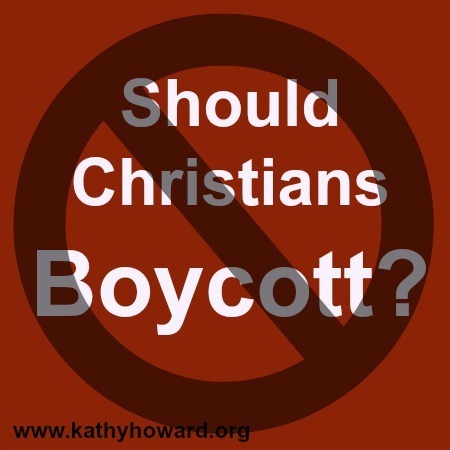
“I’m not going to Starbucks anymore,” my friend declared.
“Trying to cut back on the caffeine?” I asked.
“No. It’s because of their stand on marriage.”
Oh. I didn’t bother to tell her that the coffee in our cups was Café Verona. Or that I had just purchased Starbucks gift cards and travel mugs for Christmas presents.
But this encounter highlighted an issue I’ve been thinking about for a while. And with Christmas shopping upon us, it’s a good time to discuss it.
Should Christians participate in boycotts?
What does it mean to “boycott?”
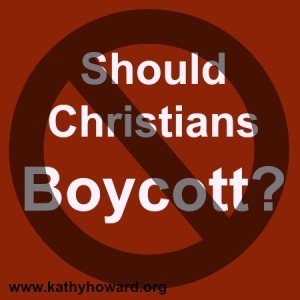 To boycott a company means to abstain from buying or using a company’s goods or services in order to intimidate or coerce. Christians often boycott companies that approve of or promote ethics or social issues contrary to our Christian faith.
To boycott a company means to abstain from buying or using a company’s goods or services in order to intimidate or coerce. Christians often boycott companies that approve of or promote ethics or social issues contrary to our Christian faith.
The primary issues in recent years have been homosexuality and abortion. For instance, some Christians have boycotted companies that offer benefits to the same-sex partners of their employees or that give money to organizations that provide abortions like Planned Parenthood. A few of the companies that show up on almost every “boycott list” include American Airlines, Disney, Home Depot, Target, and Starbucks.
So what’s a Peppermint Mocha loving girl to do?
Some Biblical Guidelines
I have searched Scripture and prayerfully decided what I should do about boycotts. I don’t believe my conclusion is the only right one or even right for you. Faithful believers fall on both sides of this issue. Unlike murder, adultery, gossip and other topics, there are no direct commands regarding boycotts in Scripture. However, there are biblical truths and principles we can apply.
Not like the world, but not separate – Jesus sent us out into the world, to spend time with those who need to know Him (Luke 5:29-32), to be light and salt in this dark and dying world (Matthew 5:13-16). He commands us to be in the world, just not to adopt the values and behavior of the world (John 17:15-18).
Don’t judge “the world” – Christians must call other Christians to repentance and obedience. But it is not the Christian’s place to judge the behavior of those outside the church (see 1 Corinthians 5:9-13). Paul commands us to separate ourselves from immoral, unrepentant Christians. He said it’s impossible to separate ourselves from immoral unbelievers.
Interacting with the world – Scripture calls us to interact with “outsiders” with respect, gentleness, and grace. In this way, we draw people to ourselves, making the most of every opportunity to share Jesus (1 Peter 3:15 and Colossians 4:5-6).
Consider your conscience – At the end of the day, when Scripture doesn’t speak specifically, seek the Holy Spirit’s guidance, consider how your behavior will affect others, and then follow your conscience. (See 1 Corinthians 8:1-13 and Romans 14:1-8.) Believers disagree on the boycott issue and that’s okay. We can each seek to glorify God without condemning another Christian’s decision.
How Does a Boycott Impact the World?
Probably the point that’s impacted my decision the most is how boycotts look to the lost world. Do they glorify God and point others to Jesus or do they simply leave a bad taste in their mouths for Christianity?
An article I read by Russell Moore presented a very valid argument on the “no boycott” side. Moore essentially said that boycotts are the way the world fights.
A boycott exposes us to all of our worst tendencies. Christians are tempted, again and again, to fight like the devil to please the Lord… But we don’t persuade our neighbors by mimicking their angry power-protests. We persuade them by holding fast to the gospel, by explaining our increasingly odd view of marriage, and by serving the world and our neighbors around us, as our Lord does, with a towel and a foot-bucket.
We cannot change the world and its ways from the outside in. The Holy Spirit is the One who transforms our thinking and behavior to conform to God’s. Our job is to introduce them to Jesus.
Will a boycott further the Gospel? If I refuse to purchase Starbucks coffee will it help me engage my neighbor about spiritual things or create opportunities to share Jesus? And what about Christians employed by Starbucks who earn their living from the company?
My Personal Decision About Boycotts
Choosing to boycott is a huge can of worms. What are the guidelines? What company policies are “anti-Christian?” Do you stop at company policies or also consider the views of management? The slant of the advertising? What about all the items a store has on their shelves? Would I stay away from iTunes because of some of the music they sell? What about the policies of my electricity provider or mortgage company?
As you can tell from the direction of the post to this point, I don’t plan to give up lattes, burn my Disney movies, or stop shopping at Target. But, I understand why other believers take a different stand. If the Holy Spirit and your heart leads you that way, then that is what you should do. This is one of those matters where believers can differ yet still live in unity.
I do consider the primary purpose of the business before making any final decisions. For instance, Starbuck’s primary purpose is to sell coffee. That’s why I give them money. But, if a company’s primary business purpose is to sell something like pornography, then I would say emphatically that Christians should not give them their money. And I wholeheartedly support Christian-owned businesses with my money and word of mouth. I choose Hobby Lobby over Michael’s and Chick-Fil-A over every other chicken sandwich.
To boycott or not to boycott, that is the question. The answer? Which action best glorifies God and furthers His Kingdom?
What about you? How has God led you regarding the issue of boycotts?
Two related articles to check out:
“Should Christians Boycott Starbucks?” by Russell Moore
“Can Christians Do Business with the World?” by Robert Rothwell
The post Should Christians Boycott? appeared first on Kathy Howard.
November 13, 2014
What’s the Big Deal about Church?

The following post (it’s a giveaway!) about church is by my author friend Jenny Lee Sulpizio. And it just so happens that I’m a contributor to her brand new book, “For The Love of God: A Woman’s Guide to Finding Faith and Getting Grace.” Sometimes we forget how integral church is to living a life of faith. Thanks Jenny for reminding us! This is post is also a giveaway!!! Read below for details.
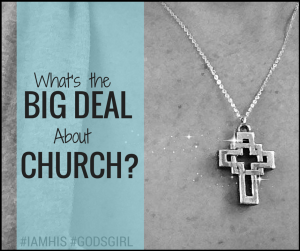 Church wasn’t a place I visited all that often as a kid; and when I did, I spent most of my time fighting with my brother, rolling my eyes in protest, or poking fun at the music director on stage. Rather than praying for peace, or speaking words of gratitude to my heavenly Father, I found myself pleading for time to pass quickly (like warp speed), so I could get home, take those stuffy church clothes off, and get back to the important things in life—like playing video games, eating Oreos, and watching cartoons.
Church wasn’t a place I visited all that often as a kid; and when I did, I spent most of my time fighting with my brother, rolling my eyes in protest, or poking fun at the music director on stage. Rather than praying for peace, or speaking words of gratitude to my heavenly Father, I found myself pleading for time to pass quickly (like warp speed), so I could get home, take those stuffy church clothes off, and get back to the important things in life—like playing video games, eating Oreos, and watching cartoons.
Needless to say, I missed out on a whole lot by not understanding the purpose of going to church, or why I needed to be there in the first place. I didn’t get this desire others had to head off to a house of worship each week—with a bunch of strangers—to praise God, together. As a kid, I failed to understand the point of it all.
However, as an adult…as a grown woman with a slew of problems and too many broken places to count, it was a haven I needed to revisit…a place I needed to give another chance.
It’s crazy how things change.
It wasn’t until I was emotionally desperate and spiritually destitute that I found myself back in the one spot I never (as in ever) thought I’d return to: church. And it was then—at that point—that I began to appreciate why people voluntarily went there. Upon my return, I was re-introduced to Jesus in a whole new way. And it was there that I realized why I never wanted to spend another Sunday morning outside those church walls. I needed this place—this church. I desired to hear God’s Word, and I wanted that challenge to live my life according to His will. As for my fellow parishioners, I wanted these people around me—their prayers, their knowledge, support, and their fellowship.
I needed this place—this sanctuary–this refuge from the world.
Friends, so many today look at the church the same way I once did. They’re not interested in learning about God, just as they couldn’t care less about knowing (or becoming) Christians. They see us and they don’t always see the Lord, do they? Indeed, the church has gotten a bad rap for sure. It’s an imperfect representation of a perfect God, Amen? However, we can change this perception. You and I? We can link arms together and reach out to those in need of knowing our heavenly father. Those who have yet to hear about His message or feel His love. Those who continue to struggle just like I did.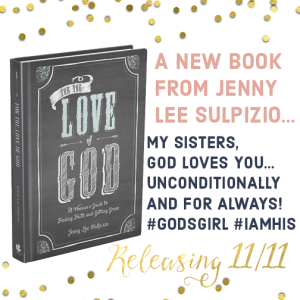
The church exists for us—God’s people—and for our redemption and restoration. She exists for the world and it’s time they hear it. It’s time they know…
Believer, what does “church” mean to you? How has God grown your understanding of His church? (I am giving away a copy of Jenny’s new book! Leave a comment to enter once. Share this post on Facebook to enter a 2nd time. Just be sure to leave a second comment telling us you entered again! Winner will be drawn at 5pm on Saturday, November 15th!))
 Jenny Lee Sulpizio is a Christian mom, wife, and author of the recently released,
For the Love of God: A Woman’s Guide to Finding Faith and Getting Grace.
She and her husband Michael reside in the uber warm state of Arizona with their three children. Connect with Jenny online by visiting her website and joining the #Godsgirl movement: www.jennyleesulpizio.com
Jenny Lee Sulpizio is a Christian mom, wife, and author of the recently released,
For the Love of God: A Woman’s Guide to Finding Faith and Getting Grace.
She and her husband Michael reside in the uber warm state of Arizona with their three children. Connect with Jenny online by visiting her website and joining the #Godsgirl movement: www.jennyleesulpizio.com
The post What’s the Big Deal about Church? appeared first on Kathy Howard.




